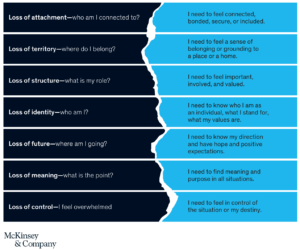13 Jun Turning loss into inspiration
The pandemic has taken the covers off an issue that has long affected leaders and the people they lead: human needs and loss.
McKinsey’s The hidden perils of unresolved grief highlights how losses related to basic human needs affect us all, for example, the loss of our sense of direction (Wonder where I am heading), or control (I feel overwhelmed), or identity (Asking myself who I am). The resulting self-doubt and erosion of confidence sap energy, productivity and happiness.
In today’s post, I explain how to recognise and manage by turning losses like these into inspiration for yourself and those you lead.
When we endure the loss of one or more of the deep-seated human needs shown below, we experience a sense of grief and related feelings of shock, anger, sadness and fear. Research shows the detrimental aspects of grief can be overcome, and the associated losses turned into inspiration for those affected and the people around them.
How to turn loss into inspiration
While loss and grief are inevitable aspects of life, unresolved grief does not have to be. Here’s how.
 1. Become aware. Becoming aware is the first step in resolving any problem. It requires opening up emotionally and getting close to those with whom you feel safe, confiding and exploring your loss and the consequences from which you are suffering. As your focus shifts outwards, your internal dialogue shifts from defensive to positive. You start returning to calm, clarity, and feeling grateful and even playfulness.
1. Become aware. Becoming aware is the first step in resolving any problem. It requires opening up emotionally and getting close to those with whom you feel safe, confiding and exploring your loss and the consequences from which you are suffering. As your focus shifts outwards, your internal dialogue shifts from defensive to positive. You start returning to calm, clarity, and feeling grateful and even playfulness.
2. Accept reality. Accepting reality requires coming to terms with what you’ve lost. To do this, you have to re-examine and relive some of the painful moments that your subconscious has been working hard to repress. This type of denial is powerful and can last a lifetime if left unresolved. As a leader, accepting reality means you have to allow yourself to be vulnerable in the eyes of others. Demonstrating vulnerability enables you to perform better and inspire others to the same.
3. Reconstruct your memory. To end the sense of loss, you must find ways to create personal meaning from the loss. When loss cuts short an important or cherished journey, you have to replace the vision by making mental and emotional choices by building a new narrative for yourself that confronts the painful memories with a new and inspiring story to enable you to turn around.
More this topic
Your organization is grieving – here’s how you can help by Aaron De Smet, September 2020


